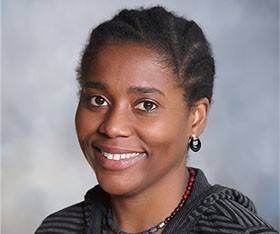Oluwatoyin Asojo, Ph.D.
If Oluwatoyin Asojo had trouble deciding in which technical area to pursue a career, she found the perfect balance. “I work at the interface of math, chemistry, biology, computation,” she says, “and I am constantly learning new things.”
Asojo is Associate Professor of Pediatrics-Tropical Medicine at Baylor College of Medicine as well as researcher at the Sabin Vaccine Institute Texas Children’s Center for Vaccine Development.
After earning a Ph.D. in chemistry at the University of Houston in 1999, Dr. Asojo held positions as assistant Professor in the Department of Pathology and Microbiology at the University of Nebraska Medical Center, research assistant professor and manager of the X-ray Crystallography Core facility at the Eppley Cancer Institute at UNMC, staff Scientist at Tibotec Therapeutics (now Janssen Therapeutics), Rockville Maryland and as research fellow at the National Cancer Institute, Frederick, Maryland. This extensive training was pivotal to developing the skills required for her current position.
Asojo is a protein crystallographer and her research interests include structure-based drug design as well as characterizing the structures and functions of proteins from neglected tropical diseases, multidrug resistant cancer and pathogenic bacteria.
One of Asojo’s favorite aspects of ACS is Project SEED. She has coordinated programs and greatly values the opportunities she’s had to mentor SEED interns and host them in her lab.
I work at the interface of math, chemistry, biology, computation... and I am constantly learning new things.
Typical day on the job:
Difficult to do since everyday is unique but at least 75% time spent in research and the rest of time is education, and service. I apply my research skills towards various diseases and have collaborators in Switzerland, Brazil, Nigeria, and USA. I work with a group of highly dedicated team of scientists that works on developing new vaccines and therapeutics for neglected tropical diseases. Research time includes supervising others as well as wet lab or in silico work. Increasingly, more of my time is spent writing papers and grants. Active research projects include structural characterization of proteins relevant to neglected tropical diseases, as well as structure based drug development for bacterial and host proteins. I also have a lot of meetings, which are important for my job.
Work schedule:
I typically work about 60 to 70 hours every week. My work is flexible and after collecting data, I can work anywhere in the world as long as I have my laptop. I occasionally travel for meetings but often Skype suffices for keeping in touch with collaborators all over the world.
Travel schedule:
I am not required to travel.
Tools you can’t live without:
My Macbook pro is my mobile laboratory and allows me to work anywhere in the world. For crystallography and structure determination, I use Pymol, CCP4, Phenix, and an X-ray source. For other tasks I use Microsoft office.
Best productivity trick:
I spend a lot of time planning before implementing anything. I believe in training personnel properly and then allowing them independence to work, which promotes creativity and productivity. For my continued growth, I take advantage of the faculty development programs that we have at Baylor College of Medicine to become a better educator and researcher.
Best career advice you’ve received:
When I was in elementary school my parents always told me "What's worth doing at all is worth doing well"
Skills or talents that make you a good fit for your job:
I am a team player, I learn new things very easily, and I am passionate about my work and its potential to improve lives.
Essential habit you wish you’d started earlier:
Planning each day in advance and saying no to last minute requests.
Favorite ACS resource:
Project SEED. I am committed to STEM education and I coordinate a summer research internship for high-school students funded by the Project SEED, the summer research internship program for economically disadvantaged high school students. Since 2001 I have had SEED students in my laboratory and the opportunity to work with the next generation of scientists is amazing.
How you've benefited from being an ACS member:
Also, when I was chair of the ACS Omaha Local Section, I enjoyed the interactions I had with other ACS members.


